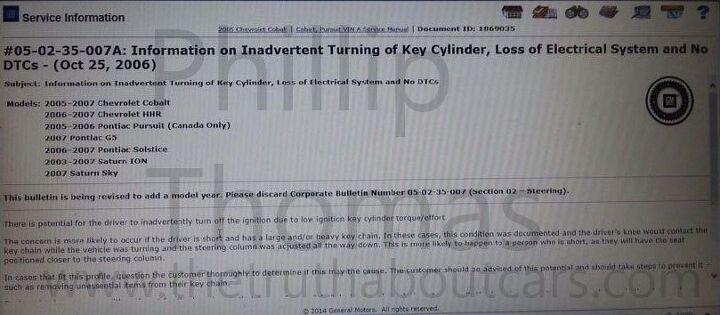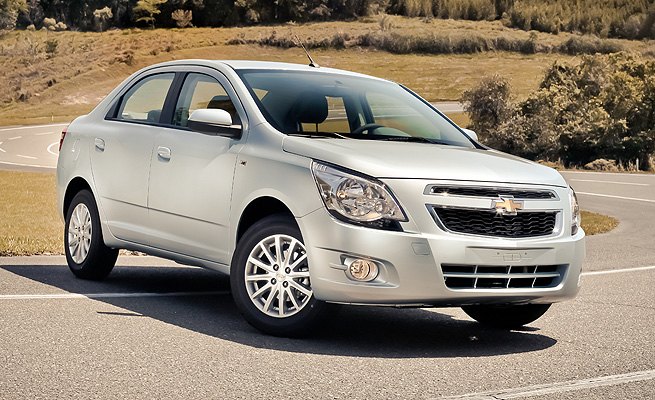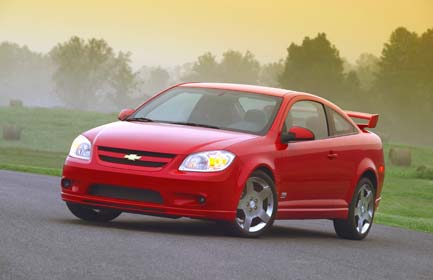#cobalt
Ask The Best And Brightest: How Do You Handle Recall And Service Bulletins?
Since arriving at TTAC, I have been continually challenged and impressed by the B&B. The knowledge, wisdom, and rather civil discourse that arrives in response to the so-called journalism I produce is awe inspiring, often. Thank you, B&B. I’ve also been tasked with handling the GM recall story, given my technical background and my familiarity with GM’s processes at the dealer level – but today, I want to turn the floor over to you.
Too Big To Fail, Too Confused To Operate: Analysis Of 619 Pages Of Cobalt Engineering Documents [w/ Full Text]
The House Energy & Commerce Committee recently released the documents GM submitted for investigation, which includes emails and internal reports documenting GM’s response to reports of their early Chevrolet Cobalt and Saturn Ion models inadvertently shutting the car “off” while driving due to an ignition cylinder that was, simply, too easy to turn out of the “run” position; and in the case of several accidents, allowed the ignition cylinder to rotate out of the run condition before or during accidents, causing the airbags to not deploy when required.
The documents, totaling 619 pages (some with repeat info), reveal just how deep seated “old GM” was in their cost cutting ways (Driving down supplier costs to the point of sacrificing quality, admittedly poorly designed ignition cylinder, and removing internal quality control on the parts), and just how blind sided “new GM” was during their investigations. It also confirms how suspended engineers Ray DeGiorgio and Gary Altman were involved in the ignition switch response, and fuzzy problem solving. Full text and an analysis of key documents below.
GM Found Ignition Switch Issues In 2001 With Saturn, Updated Chronology, New Study Shows 303 No-Airbag Deaths [w/ Full Text]
General Motors released their updated chronology to the recall effecting the 2007 and earlier Chevrolet Cobalt and HHR; Pontiac G5 and Solstice; and Saturn Ion and Sky. Most of the new chronology works just to update the document with the expanded recall, but there’s a key update:
During the Saturn Ion development in 2001, a preproduction model had an ignition cylinder problem that was caused by, you guessed it, “low detent plunger force,” the result being that it takes a low amount of effort to knock the key out of the “run” position.
General Motors Expanding Ignition Cylinder Recall To Other Models, Releases Timeline On Failure [w/ Full Text]
“The process employed to examine this phenomenon was not as robust as it should have been. We are deeply sorry and we are working to address this issue as quickly as we can.” — Alan Batey, president of General Motors North America
Yesterday, GM expanded their ignition switch recall to include the other models mentioned in the #05-02-35-007A Technical Information Service Bulletin (“ISB”). These include:
- 2005 – 2007 Chevrolet HHR
- 2006 – 2007 Pontiac Solstice
- 2003 – 2007 Saturn Ion
- 2007 Saturn Sky
The National Highway Traffic Safety Administration is also launching a probe into why GM took so long to issue a recall. GM also released their chronology of the ignition cylinder issue and years of investigation to TTAC, which we will break down for your digestion along with the full text, after the jump.
GM Adds 588,000 Vehicles To Ignition Recall
Originally affecting 780,000 2005 – 2007 Chevrolet Cobalts and Pontiac G5s, General Motors has now added another 588,000 vehicle in a recall to fix ignition switches that can lead to the engine being shut off. So far, 31 crashes and 13 front-seat deaths have been linked to the issue.
GM Knew About Deadly Defect For Nearly A Decade, Dismissed It In Technical Service Bulletin
GM is recalling 778,000 units of the 2005 through 2007 Chevrolet Cobalt and Pontiac G5 over an issue where the ignition cylinder inadvertently turns out of the “Run” position, there by turning the car’s main electrical systems “off”. These systems include the engine, anti-lock brakes, and airbag systems. According to USA Today, GM knew of six deaths, and twenty-two other wrecks related to the ignition failure, and was aware of the defect since 2004.
Question Of The Day: Have We Passed The Peak Of Cheap?
The good old days of late summer 2009.
It was a great time to buy a new car. Monthly new car sales in North America had plummeted to under 10 million units. Access to financing seemed to be near impossible for a lot of consumers. Brands were orphaned. Leasing collapsed. Banks were picky. The future was uncertain and… raw materials were cheap.
It was a good time to buy new at a deep, deep discount. Has that time passed?
Review: Chevy Cobalt, Brazilian Spec
GM do Brasil has been having many problems. Though dearly beloved by many Latin Americans, in Brazil its image has been severely tarnished. When GM promised a slew of new products that would substitute its ageing line, many doubted it. In fact, many doubted GM had it in them anymore. Like a phoenix, GM is being reborn. The new product onslaught is in full swing. First off the bat was the Cruze. Now, Chevrolet is really starting to put on offer its mission-critical small car, the Cobalt. Will it be enough?
First a little background. After a very prosperous and promising 90s, it seemed GM had called it quits in the 00s. Extreme penny pinching eliminated but the most basic forms of engineering and development. The interiors were the most hideous on this side of a Trabant. You get the picture.
New or Used: Avoid "Titanium" Grade Depreciation
Shawn writes:
Hey Sajeev and Steve,
I recently asked the Best and Brightest for help regarding my friend’s car buying dilema, but now I’m in one of my own! I am looking to get rid of my 2006 Mazda5 GT, which has been quite problematic. I can no longer tolerate the frequent trips to the shop. Its got about 125,000km on it, and I’ve been getting offers ranging from $6000-8000 for it on trade. The cars I am considering are in the compact to mid-size class, but there are benefits to each car, and I can’t seem to make up my mind. I am seeking a car with decent fuel economy that is fairly engaging to drive. However, I DO NOT want a harsh ride. The GTA is filled with pot holed roads, and I know the stiff ride would get tiresome. Manual transmission is preferred, but not necessary. I do carry four people occasionally, so cross out any coupes. On the Mazda I’ve taken quite a hit in the residual value, so this time around, I am looking to buy something that is a couple of years old. That way, someone else takes the largest depreciation hit. Here is the list so far:Quote Of The Day: We Get It Starting Now Edition
Look at this car, it’s horrible. How did this get through so many people?
We’ve all thought something along these lines when we first sat in a Chevy Cobalt, but few GM employees would ever say it out loud to a reporter. At least they wouldn’t until a much-improved replacement was waiting in the wings. But because the Cruze launches this year, GM execs like VP of global vehicle engineering Karl Stracke can bash on the old Cobalt to his heart’s content, knowing the Detroit News will dutifully report it as a sign that GM “gets it.”
GM To Recall 1.3 Million Cobalt/G5s
We at TTAC, (well, me, only) have said that since everyone is raining a storm down on Toyota other recalls are slipping by without equal scrutiny. So when I read this article, I thought it fair, in the interests of journalism, to blog it. Not because of who it is, but the reasoning around it.




![Too Big To Fail, Too Confused To Operate: Analysis Of 619 Pages Of Cobalt Engineering Documents [w/ Full Text]](https://cdn-fastly.thetruthaboutcars.com/media/2022/06/30/8656019/too-big-to-fail-too-confused-to-operate-analysis-of-619-pages-of-cobalt-engineering.jpg?size=720x845&nocrop=1)
![GM Found Ignition Switch Issues In 2001 With Saturn, Updated Chronology, New Study Shows 303 No-Airbag Deaths [w/ Full Text]](https://cdn-fastly.thetruthaboutcars.com/media/2022/06/30/8650982/gm-found-ignition-switch-issues-in-2001-with-saturn-updated-chronology-new-study.jpg?size=720x845&nocrop=1)
![General Motors Expanding Ignition Cylinder Recall To Other Models, Releases Timeline On Failure [w/ Full Text]](https://cdn-fastly.thetruthaboutcars.com/media/2022/06/30/8648339/general-motors-expanding-ignition-cylinder-recall-to-other-models-releases-timeline.jpg?size=720x845&nocrop=1)


















Recent Comments